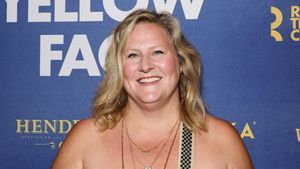
Treatment GuideJust DiagnosedSex & DatingAfrican AmericanStigmaAsk the HIV DocPrEP En EspañolNewsVoicesPrint IssueVideoOut 100
CONTACTCAREER OPPORTUNITIESADVERTISE WITH USPRIVACY POLICYPRIVACY PREFERENCESTERMS OF USELEGAL NOTICE
© 2024 Pride Publishing Inc.
All Rights reserved
All Rights reserved
By continuing to use our site, you agree to our Private Policy and Terms of Use.
No one disputes that many AIDS service organizations around the country are increasingly falling on hard economic times. President George W. Bush and Congress have flat-funded the vast majority of federal Ryan White AIDS programs. Private foundations and individual donors are commonly scaling back donations because of the pressures of other funding priorities or simply because of 'donor fatigue' after two decades of supporting AIDS causes. Fund-raising efforts at some organizations, like AIDS walks, have seen dramatic falloffs in participation. As a result, budgets at many ASOs have become increasingly tight. So it might seem surprising that many cash-strapped ASOs are offering programs to people with non-HIV-related diseases and to other healthy populations like the elderly. AIDS Project Los Angeles and New York's Gay Men's Health Crisis, for example, teamed up in 2004 to launch the Institute for Gay Men's Health, which promotes overall wellness. AIDS Foundation Houston will launch an initiative later this year to combat homelessness. San Francisco's AIDS Emergency Fund added a separate division April 2002 for breast cancer patients. Nutrition groups Project Open Hand in San Francisco and Atlanta, God's Love We Deliver in New York, Project Angel Food in Los Angeles, and Food & Friends in Washington, D.C., all now serve non-HIV populations. Diversification at ASOs is not a new phenomenon. Some groups have offered expanded services for nearly a decade, with hospices, buddy programs, and meal delivery programs being among the first to do so. But the trend appears to be picking up steam, with even large urban AIDS centers now extending their reach'and subsequently their fund-raising base, says Frank Beadle de Palomo, senior vice president and director of the Washington, D.C.'based Academy for Educational Development's Center on AIDS and Community Health. 'Whether it is because of losses in Ryan White funding or just where we are with the disease, I do think we are going to see more of this,' he says. Diversification is becoming so common among food providers that the Association of Nutrition Services Agencies, an umbrella group representing more than 110 ASOs in the U.S., held a daylong seminar on the topic in 2004 that included talks by leaders of groups that have successfully broadened their missions and offers of guidance to groups that are considering expanding their reach. ANSA executive director Frank Abdale says his group was compelled to provide leadership on diversification issues because so many member groups are considering offering their services to clients who are not HIV-positive. More than a dozen of the association's members have either broadened their missions already or are planning on doing so soon, he says. Atlanta's Project Open Hand is an ANSA member that is already providing meal deliveries and nutritional counseling to people with other critical, chronic, and terminal illnesses. 'The reason for our expansion was based on the experience the project has gained over the years,' says Project Open Hand Atlanta executive director Stephen Woods, who spoke at the ANSA conference. 'The question was put to us by other community groups, 'Would there ever be a way to serve additional populations?' That's what drove expansion in our case.' Meeting Unmet Needs Many AIDS groups'from small to large'that have expanded their services similarly say the drive for diversification was prodded by requests from other charitable groups or because the ASOs recognized unmet needs in other areas. 'We recognized we had something to offer to the larger community,' says John Huckaby, vice president of planning and program development for AIDS Foundation Houston, which is expanding into services for homeless people with the launch of a new project this year. But San Francisco activist Michael Petrelis suggests that AIDS agencies interested in expansion should instead work to identify and address unmet needs among existing clients. 'With so many AIDS patients across America struggling for housing subsidies, money for antivirals and vitamins, healthy foods, and in some cases access to doctors and nurses, I say the AIDS crisis is not over. Until it is, AIDS groups should first meet all the needs' of HIVers, he says. Petrelis is not alone in his concerns. Some ASOs themselves are resisting calls for expansion'or are extending their reach only slightly'because of concerns that HIV services could be affected. Seattle-based Multifaith Works has added to its AIDS housing program with a housing facility for people with multiple sclerosis, but its AIDS CareTeam program director, Trudy James, resists broadening her volunteer-based program beyond serving HIV clients. 'People always say to me, 'You have such a good model. Why don't you open it up to other illnesses?' But every place I saw that happen,' she says, 'AIDS drops right out of the mix.' The Interfaith AIDS Ministry of Greater Danbury in Connecticut, is planning to open its food services to other populations, but executive director Melinda Storey says the agency will not broaden its other programs. AIDS Care Service in Winston-Salem, N.C., has no plans to provide any of its services to non-HIV populations, according to executive director Larry Roth. 'There is more work here than we can do just dealing with AIDS,' he explains. The AIDS Foundation of Chicago likewise remains dedicated solely to HIV issues, but meeting the diverse and changing needs of HIVers has led the agency to form partnerships with non-AIDS-oriented organizations, such as those working to address social injustices that affect many people'including HIVers. 'We're still serving the same people, but our approach has changed,' says associate director for policy and communications David Munar. For some agencies, like Baltimore's Chase Brexton Health Services, diversification meant a return to their broader roots, which turned AIDS-specific when the epidemic exploded in the 1980s. Today, Chase Brexton still treats the same number of HIV-positive clients, says David Haltiwanger, Ph.D., director of clinical programs and public policy, but it also is welcoming gay men and lesbians seeking general health care as well as nongay city residents drawn by the center's stigma-free environment. Money Matters While many AIDS groups say they have expanded'or are considering doing so'because their expertise is needed elsewhere, all agree that diversification has opened up lucrative new funding streams that were unavailable for AIDS-specific programming. 'We were able to access Medicaid funding and also specifically funding from private foundations that are geared toward issues like breast cancer,' Woods says of Atlanta's Project Open Hand. 'A long time ago funding for our expanded mission surpassed HIV funding.' At San Francisco's AIDS Emergency Fund, which provides financial assistance to as many as 2,500 people disabled by HIV, officials conducted a round of fund-raising before officially launching the agency's Breast Cancer Emergency Fund to ensure that they would be able to raise enough new money for the program. 'We continue to run separate fund-raising programs for each of the pieces,' Smith says. But Paul, who asked that his last name not be used, an HIV-positive San Francisco resident who relies on the fund for assistance, says the agency should not be devoting resources to raising money for breast cancer outreach, particularly since, he says, the fund temporarily suspended his eligibility in early 2003 and cut the amount of money made available to him when he was reinstated a few months later. 'Of course I am concerned for the breast cancer patients in my heart,' he says. 'However, this type of business model is clearly questionable as to its concept and design.' Petrelis has similar worries: 'Are the resources intended for [HIVers] diverted to other sick people when ASOs expand their agendas?' Smith, however, guarantees that resources are not being taken away from AIDS programs to support the emergency fund's expanded mission, noting that tightened eligibility and reduced benefits for HIV-positive clients resulted from an ongoing struggle to raise AIDS dollars. 'We have actually run some big deficits over the past three years and used some of our reserves,' Smith says. He adds that the breast cancer program's money comes from 'a different funding pool'foundations, community groups, different donors' that focus on that condition. While these types of new funding sources can go a long way toward shoring up the fiscal strength of an AIDS service organization'particularly through grants for shared infrastructure and support programs'creating new programs simply to bolster the bottom line is a big mistake, many experts in the AIDS arena warn. 'It is irresponsible to chase the money and dilute the mission if there is no clear evidence that there is a service gap that needs to be filled,' says Kandy Ferree, president of the National AIDS Fund, which supports nearly 400 groups nationwide through its leadership and challenge grants. 'We believe that no organization, including AIDS organizations, should ever diversify solely to ensure its own self-interest and its own viability.' De Palomo says haphazardly broadening an agency's reach simply to gain more funding could ultimately lead to the downfall of the organization. 'Going into areas just because the dollars are there puts the organization at risk of being off-mission and will affect the quality of care for people with AIDS,' he says. 'And if you do that, you are in danger of having your core population stop coming.' To help guarantee that AIDS services are not adversely affected by expansion, ASO leaders say they welcome questions from their clients and scrutiny from AIDS activists. 'Advocates definitely should be asking questions,' Woods says. 'And we need to be constantly examining our mission to make sure it is current and fulfilling the needs of the people we serve.' Ferree also recommends that agencies considering diversification consult with people living with or affected by HIV in the new development plans and be responsive to the concerns of activists. 'It is absolutely critical that the organization communicate with, share information with, and be transparent to their primary constituency about how expansion of services is going to ultimately also be beneficial to people living with or affected by HIV,' she says. 'And if that justification cannot be made, I think it is a very difficult sell to expect people who are affected by HIV to be able to support it.' The Road Ahead But no matter how difficult the sell or ultimately how successful expansion proves to be for individual organizations, Ferree believes that broad-based restructuring at ASOs'be it diversification, partnerships with other service groups, or merging agencies'is inevitable given today's funding climate. 'The reality about HIV services at the community level is that, in my opinion, the multitude of organizations and systems currently in place is not sustainable over the long haul,' Ferree says. 'We have two choices: We can work together to maximize the limited resources we have to benefit the interest of the clients, or there will be a natural evolution and we'll be swallowed up by economic circumstances and economic realities. Change will come, one way or the other. 'From the very beginning,' Ferree continues, 'the HIV service system has been progressive, freethinking, and creative. We did whatever was necessary to make sure our friends, family members, and colleagues had the services they needed, even when it was not popular. We can do the same thing today to ensure essential services survive. The real question is, Do we have the courage to do it?'
From our Sponsors
Most Popular
Why activist Raif Derrazi thinks his HIV diagnosis is a gift
September 17 2024 12:00 PM
How fitness coach Tyriek Taylor reclaims his power from HIV with self-commitment
September 19 2024 12:00 PM
Exclusive: We kiki with Q from 'RuPaul's Drag Race'
June 24 2024 11:37 AM
Out100 Honoree Tony Valenzuela thanks queer and trans communities for support in his HIV journey
September 18 2024 12:00 PM
The freedom of disclosure: David Anzuelo's journey through HIV, art, and advocacy
August 02 2024 12:21 PM
Creator and host Karl Schmid fights HIV stigma with knowledge
September 12 2024 12:03 PM
Activist and philanthropist Bruce Bastian dies at 76
June 26 2024 1:28 PM
In honor of Juneteenth 2024, meet The Normal Anomaly
June 19 2024 1:39 PM
Plus: Featured Video
Latest Stories
Ricky Martin delivers showstopping performance for 2024 World AIDS Day
December 05 2024 12:08 PM
AIDS Memorial Quilt displayed at White House for the first time
December 02 2024 1:21 PM
Climate change is disrupting access to HIV treatment
November 25 2024 11:05 AM
California confirms first case of even more deadly mpox strain
November 18 2024 3:02 PM
Post-election blues? Some advice from mental health experts
November 08 2024 12:36 PM
Check out our 2024 year-end issue!
October 28 2024 2:08 PM
Meet our Health Hero of the Year, Armonté Butler
October 21 2024 12:53 PM
AIDS/LifeCycle is ending after more than 30 years
October 17 2024 12:40 PM
Twice-yearly injectable lenacapavir, an HIV-prevention drug, reduces risk by 96%
October 15 2024 5:03 PM
Kentucky bans conversion therapy for youth as Gov. Andy Beshear signs 'monumental' order
September 18 2024 11:13 AM
Study finds use of puberty blockers safe and reversible, countering anti-trans accusations
September 11 2024 1:11 PM
Latinx health tips / Consejos de salud para latinos (in English & en espanol)
September 10 2024 4:29 PM
The Trevor Project receives $5M grant to support LGBTQ+ youth mental health in rural Midwest (exclusive)
September 03 2024 9:30 AM
Introducing 'Health PLUS Wellness': The Latinx Issue!
August 30 2024 3:06 PM
La ciencia detrás de U=U ha estado liberando a las personas con VIH durante años
August 23 2024 2:48 PM
Tratamiento y prevención del VIH por inyección: Todo lo que necesita saber
August 23 2024 2:41 PM
Sr. Gay World quiere asegurarse de que estés bien
August 23 2024 2:30 PM
Eureka is taking a break from competing on 'Drag Race' following 'CVTW' elimination
August 20 2024 12:21 PM
With a new case in Sweden, what is the new mpox outbreak and should you be concerned?
August 15 2024 4:48 PM
















































































